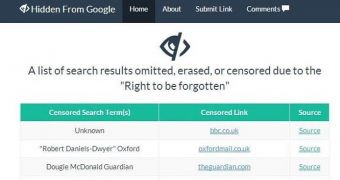In Europe, Google, as well as basically any other search engine, has to listen to people complaining about newspapers, magazines and blogs writing things about them and even to remove links from search results pages when the information is no longer “relevant.”
On top of the obvious dose of subjectivism required to asses all these requests, it is fairly clear that the “right to be forgotten” can easily be abused of. Furthermore, the entire thing is rather pointless since the decision only affects Google’s European pages and not foreign ones, such as the most popular one – Google.com.
Users can easily switch over to that version either by clicking the “Use Google.com” button in the right lower corner or adjusting the URL to include “/ncr” after the regular link to prevent the redirection that sometimes takes place when visiting the site from outside the United States.
This means that anyone who notices one of the alerts that some links have been removed from the search results page can very easily push the same query over on Google.com and all the links, even those that someone wanted to be taken down.
Google has protested against the decision taken by the European Court of Justice, but it really wasn’t much it could do from a legal standpoint aside from making it obvious that the entire thing was a joke. The only way to force people to stay on their local Google pages is to have Google restrict their access to that particular version, something that’s highly unlikely to happen. Even if it does, there’s a pretty high chance that more individuals will learn how VPN tools work rather than be confined.
To make the European decision that much more irrelevant, a programmer from New Jersey created an archive called “Hidden from Google.”
The name is pretty dead giveaway about the contents of the archive – it contains links that Google removed from search results upon request under the European directive.
The site doesn’t automatically take note of all links that vanish from search results, but it relies on news reports about the specific websites that were removed. Since news organizations receive notifications following the takedown, they haven’t exactly been shy about telling the world about them, making for a really easy archive to compile.
The archive is only now starting to build, but new entries can be submitted by anyone, so it’s quite likely to grow quite fast.

 14 DAY TRIAL //
14 DAY TRIAL //